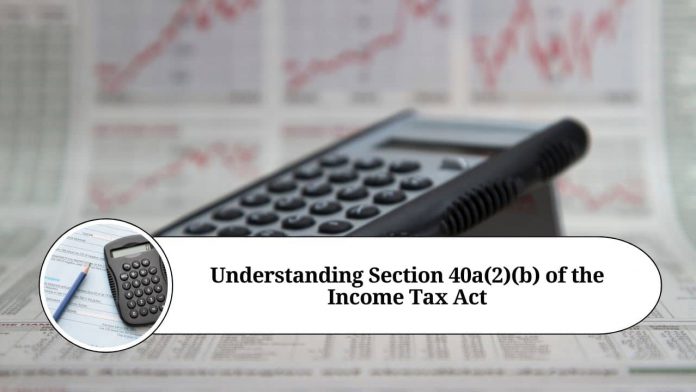The Indian Income Tax Act, of 1961 is a comprehensive legislation that governs the taxation of individuals and entities in India. One of the important provisions of the Act is Section 40a(2)(b), which deals with the disallowance of expenses in case of non-deduction of tax at source. In this article, we will discuss this provision in detail and its implications for taxpayers.
What is Section 40a(2)(b) of the Income Tax Act?
Section 40a(2)(b) of the Income Tax Act states that any sum paid by an assessee to a resident for professional or technical services shall be disallowed as a deduction in computing the income chargeable under the head “profits and gains of business or profession,” if the tax at source has not been deducted from such sum or, after deduction, has not been paid on or before the due date specified in Section 139(1).
In simpler terms, if a taxpayer has paid any amount to a resident for professional or technical services and has not deducted tax at source or has deducted but not deposited it within the specified time, then such payment will not be allowed as a deduction while calculating the taxable income.
Who is an assessee under Section 40a(2)(b)?
An assessee under Section 40a(2)(b) refers to any person who is liable to pay tax under the Income Tax Act. This includes individuals, HUFs, partnership firms, LLPs, companies, and any other entity that is subject to taxation in India.
What are professional or technical services?
Professional or technical services refer to any service rendered by a person in the course of carrying on a profession or business. This includes services provided by doctors, lawyers, accountants, engineers, architects, and other professionals. It also includes services provided by technical experts such as IT consultants, software developers, and other professionals.
When is tax at source to be deducted under Section 194J?
Under Section 194J of the Income Tax Act, tax at source is required to be deducted in the following cases:
- Payments made for professional or technical services rendered by a resident
- Payments made for royalty, patent, copyright, technical know-how, and other similar rights
- Payments made for any other sum payable to a resident for services rendered (not being salary)
The rate of tax to be deducted at source under Section 194J is 10% of the amount paid or credited to the payee. However, if the recipient does not provide their PAN details, the rate of tax deduction is increased to 20%.
What is the due date for depositing tax deducted at source?
Tax deducted at source under Section 194J is required to be deposited on or before the 7th of the following month in which the deduction is made. For example, tax deducted in May is to be deposited on or before the 7th of June.
Read Other Useful Blogs:
What is the penalty for non-deduction or non-payment of tax at source?
If a taxpayer fails to deduct tax at source or fails to deposit the tax deducted within the specified time, they will be liable to pay a penalty equal to the amount of tax that was not deducted or deposited. Additionally, interest may also be levied on the unpaid tax amount.
Final Conclusion
Frequently Asked Questions:
Q: What is section 40a(2)(b) of the Income Tax Act?
A: Section 40a(2)(b) of the Income Tax Act is a provision that disallows deductions for any expenses incurred by a taxpayer in respect of any payment made to a related party unless the taxpayer can prove that the payment was made at arm’s length and for a genuine business purpose.
Q: What does “related party” mean in section 40a(2)(b)?
A: “Related party” refers to any person who has a substantial interest in the business of the taxpayer or who is closely related to the taxpayer. This can include family members, business partners, and entities in which the taxpayer has a significant ownership interest.
Q: What types of payments are covered by section 40a(2)(b)?
A: Section 40a(2)(b) applies to all types of payments made to related parties, including payments for goods, services, rent, interest, and royalties.
Q: Can a taxpayer claim a deduction for a payment made to a related party if it was made at arm’s length?
A: Yes, a taxpayer can claim a deduction for a payment made to a related party if it was made at arm’s length and for a genuine business purpose. However, the burden of proof is on the taxpayer to demonstrate that the payment was made at arm’s length.
Q: What is the penalty for violating section 40a(2)(b)?
A: The penalty for violating section 40a(2)(b) is equal to the amount of the payment that was made to the related party. This penalty is in addition to any tax that is payable on the income that was not properly deducted.
Q: Is there any exception to the disallowance of deductions under section 40a(2)(b)?
A: Yes, there are certain exceptions to the disallowance of deductions under section 40a(2)(b), such as payments made to a related party who is a resident of a foreign country and the payment is subject to tax in that country. However, these exceptions are subject to certain conditions and limitations.




















